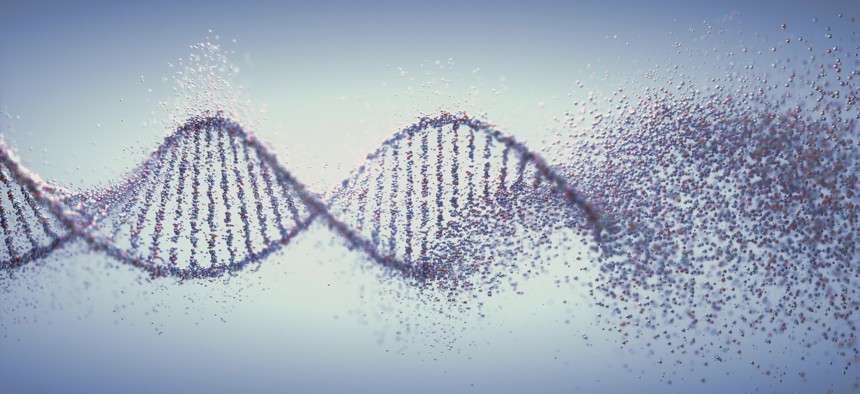NIST inks partnership to put safety at the intersection of AI and genetic research

KTSDESIGN/SCIENCE PHOTO LIBRARY/Getty images
A new partnership between NIST and the Engineering Biology Research Consortium looks to secure biotechnologies from being exploited by powerful AI systems.
The federal government took a new step Friday in addressing the potentially hazardous intersections of emerging technologies: artificial intelligence and biotechnology.
The National Institute of Standards and Technology inked a new partnership with the nonprofit Engineering Biology Research Consortium to help develop effective safety tools specifically aimed at preventing the misuse of advanced AI when leveraged to synthesize DNA and RNA – the building blocks of cells. Synthetic nucleic acids are manufactured outside of cells with the help of chemical processes.
Biotechnical applications for synthetic nucleic acids are advanced, and researchers have used them to develop novel medical therapies and drugs, as well as in agricultural research.
The new collaboration, required under President Joe Biden’s October 2023 executive order on AI, will work toward developing best practices, standards and implementation guidance for synthesizing nucleic acids to prevent misuse when leveraging generative AI software to sift through data and help develop these solutions.
“The goal is to bring together stakeholders to identify and describe the necessary infrastructure for ensuring safety and security in the synthesis of nucleic acids,” a NIST spokesperson told Nextgov/FCW.
The new cooperative research between NIST and the Engineering Biology Research Consortium plans to connect with industry and other stakeholders to develop safeguards that prevent the potential risks of AI when deployed in synthesizing genetic material.
“This agreement is the first step toward promoting safe research in engineering biology as tasked to NIST under the recent AI executive order,” NIST Director Laurie Locascio said in a statement. “The promise of this technology is immense, but clearly safeguards are needed to protect the public, and this is an important first step toward creating them.”
Both biotechnologies and artificial intelligence are included on the White House Office of Science and Technology Policy’s list of emerging technologies. The Biden administration is navigating how to continue spurring innovation in these industries while protecting human rights and national security.






